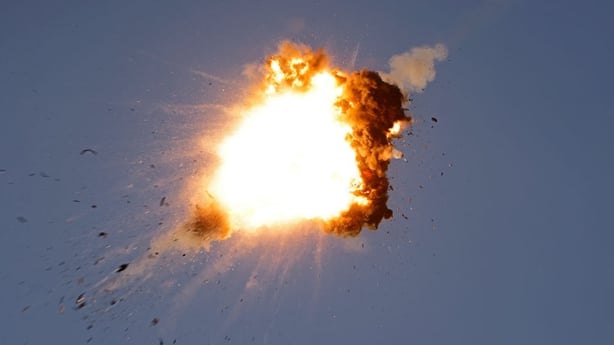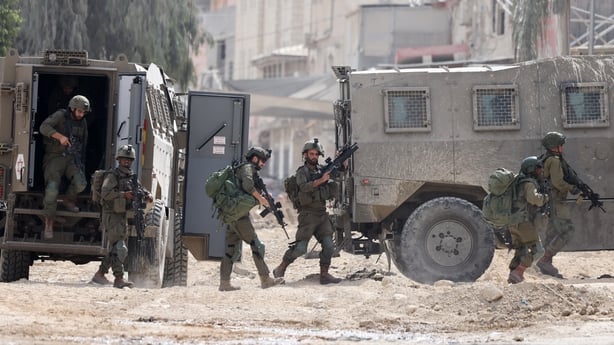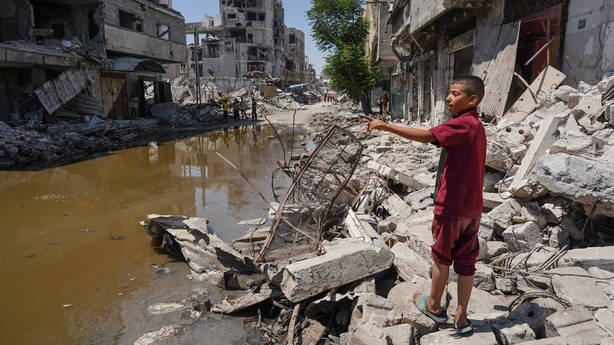A broader regional war in the Middle East, where conflict already rages between Hamas and Israel, remains a "significant risk", the head of the UN peacekeeping force warned.
Speaking to reporters in Brussels, United Nations Under-Secretary-General for Peace Operations Jean-Pierre Lacroix warned against making assumptions about how regional actors will behave.
"The perception could exist that there are certain rules that neither parties want to trespass and therefore that we are in a situation that is more stable than one could think," Mr Lacroix said on the sidelines of an EU defence ministers' meeting.
"There is still a very significant risk of escalation at the regional level," he said, adding: "We are still very much in a very, very dangerous type of situation."
Tensions have risen since the start of Israel's war in Gaza in October, with Hezbollah supporting the Palestinian armed group Hamas with operations in southern Lebanon, including daily exchanges of fire with Israeli troops.
Hundreds of Hezbollah fighters have been killed in cross-border fighting, while around 100,000 people on both sides of the border have been displaced.

Mr Lacroix warned of the risk of an "unintended" escalation or a "misunderstanding".
"One of the risks, in particular in southern Lebanon, is both parties not exactly understanding where the other is in terms of calculus," he said.
On Sunday, Hezbollah carried out a major drone and rocket attack against Israel, in retaliation for the death of one of its military leaders, Fuad Shukr, killed in an Israeli strike near Beirut on 30 July.
In response, Israel launched air strikes into Lebanon the same day.
Amid escalating tensions, the UN Security Council extended the mandate of the UN peacekeeping force in Lebanon - numbering around 10,000 - for a year.
The war in Gaza erupted after Hamas-led militants attacked Israel on 7 October, resulting in the deaths of 1,199 people, mostly civilians, according to an AFP tally based on Israeli official figures.
Israel's retaliatory military campaign has killed at least 40,602 people in Gaza, according to the Hamas-run territory's health ministry.
We need your consent to load this rte-player contentWe use rte-player to manage extra content that can set cookies on your device and collect data about your activity. Please review their details and accept them to load the content.Manage Preferences
Concern over West Bank operation
Israel this week also pressed a large-scale military operation in the occupied West Bank, despite UN concerns it is "fuelling an already explosive situation".
The UK said it was "deeply" concerned by this, urging it to "exercise restraint" and adhere to international law.
Israel's operation in the occupied territory entered its third day Friday, with the death toll rising to at least 19.
Israel described its raids on towns and refugee camps across the northern West Bank as "counter-terrorism" operations.
"We recognise Israel's need to defend itself against security threats, but we are deeply worried by the methods Israel has employed and by reports of civilian casualties and the destruction of civilian infrastructure," a spokesperson for the UK foreign ministry said.
The spokesperson added in a statement that the risk of regional instability was serious while "the need for de-escalation urgent".

The statement called on Israeli authorities to "exercise restraint, adhere to international law, and clamp down on the actions of those who seek to inflame tensions".
Britain also criticised comments made earlier this week by Israeli National Security Minister Itamar Ben-Gvir, a settler and proponent of West Bank annexation.
The senior member of Prime Minister Benjamin Netanyahu's coalition government said he would build a synagogue at Jerusalem's flashpoint Al-Aqsa mosque compound if he could.
"The UK strongly condemns settler violence and inciteful remarks such as those made by Israel's National Security Minister Ben-Gvir, which threaten the status-quo of the Holy Sites in Jerusalem," the spokesperson said.
"It is in no one's interest for further conflict and instability to spread in the West Bank."
Polio vaccine campaign to get under way
United Nations officials are preparing to launch a polio vaccination campaign in Gaza on Sunday that will rely on a series of limited pauses in fighting between Israeli forces and Hamas militants holding out in the besieged enclave.
The World Health Organization says it will need to vaccinate at least 90% of the children in Gaza for the campaign to succeed but it faces huge challenges in the Palestinian enclave, which has been largely destroyed by nearly 11 months of war.
The campaign has been organised after the WHO said on 23 August that a baby had been paralysed by the type 2 polio virus, the first such case in the territory in 25 years, and UN agencies appealed for an urgent vaccination effort.
Some 1.2 million vaccine doses have already been delivered to Gaza ahead of the campaign, which aims to vaccinate more than 640,000 children, a WHO official said.
An additional 400,000 doses are en route to the territory, said Rik Peeperkorn, the WHO's representative for the occupied Palestinian territories.

The planned pauses are unconnected with negotiations that have been underway for months to try to agree a halt in the fighting in Gaza and a return of Israeli and foreign hostages in exchange for Palestinian prisoners held by Israel.
COGAT, the Israeli agency that coordinates administration in the occupied Palestinian territories, said the pauses would be coordinated as part of a series of humanitarian pauses implemented periodically since the start of the Israeli campaign in Gaza last October.
Hamas has also agreed to the pauses, which the UN says are needed for the campaign to begin at all. A second round of vaccinations will be needed once the first round is complete.
The WHO has said the Israeli military and Hamas have agreed to three separate, zoned three-day pauses in fighting to allow the first round of vaccinations to be undertaken by UN agencies in coordination with the Palestinian health ministry.
More than 2,180 staff have been trained to provide vaccinations and information about the campaign to people in Gaza.

